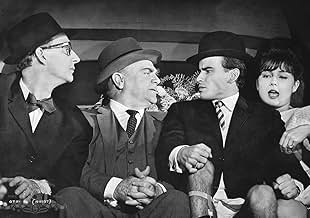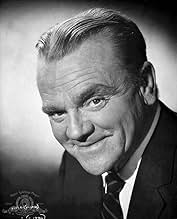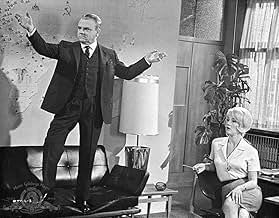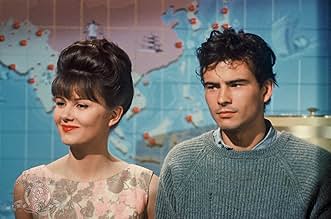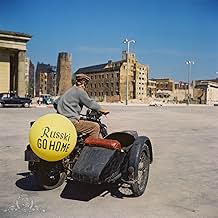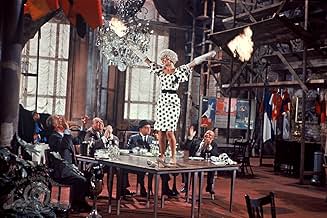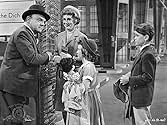ÉVALUATION IMDb
7,8/10
24 k
MA NOTE
À Berlin-Ouest pendant la guerre froide, un cadre de Coca-Cola est chargé de s'occuper de la fille de son patron.À Berlin-Ouest pendant la guerre froide, un cadre de Coca-Cola est chargé de s'occuper de la fille de son patron.À Berlin-Ouest pendant la guerre froide, un cadre de Coca-Cola est chargé de s'occuper de la fille de son patron.
- Director
- Writers
- Stars
- Nommé pour 1 oscar
- 1 victoire et 8 nominations au total
Liselotte Pulver
- Fräulein Ingeborg
- (as Lilo Pulver)
Loïs Bolton
- Melanie Hazeltine
- (as Lois Bolton)
John Banner
- Krause
- (voice)
- …
Christine Allen
- Cindy MacNamara
- (uncredited)
Avis en vedette
James Cagney was pretty much retired when Billy Wilder lured him away from his farm to do "One, Two, Three," a witty, fast-moving comedy from 1961. And what a credit to Cagney - rapid dialogue and plenty of it, taxing to memorize probably for a man half his age.
The story concerns an American Coca-Cola executive, C.R. McNamara, heading up an office in Berlin who is asked by his boss to host his daughter (Pamela Tiffin). Hoping for a plum assignment in London, C.R. and his wife (Arlene Francis) welcome the young woman with open arms. She's southern, beautiful, flirtatious, and before they know it, she's got a Communist boyfriend (Horst Bucholz) Then he becomes her Communist husband, and that London promotion is looking less and less likely unless C.R. can pull off a miracle.
Wilder's direction for this was to have the dialogue shouted rather than spoken and to keep the film moving at a very fast pace. Admittedly this can get a little exhausting. Cagney gives a high-voltage performance and is extremely funny as the harried executive. And there are some hysterical bits as well as the madcap feeling of a '30s film. The rest of the cast is wonderful: Arlene Francis as C.R.'s long-suffering wife, Lilo Pulver as C.R.'s sexy secretary, and Hanns Lothar as Schlemmer, C.R.'s assistant who was "underground" during the war. ("The resistance?" "No, the subway. Nobody told me anything down there.") Though this was not a happy set - Wilder and Cagney had their differences, and Horst Buccholz was a major pain - the result is very good. Late in their careers, Wilder and Cagney still had it. Big time.
The story concerns an American Coca-Cola executive, C.R. McNamara, heading up an office in Berlin who is asked by his boss to host his daughter (Pamela Tiffin). Hoping for a plum assignment in London, C.R. and his wife (Arlene Francis) welcome the young woman with open arms. She's southern, beautiful, flirtatious, and before they know it, she's got a Communist boyfriend (Horst Bucholz) Then he becomes her Communist husband, and that London promotion is looking less and less likely unless C.R. can pull off a miracle.
Wilder's direction for this was to have the dialogue shouted rather than spoken and to keep the film moving at a very fast pace. Admittedly this can get a little exhausting. Cagney gives a high-voltage performance and is extremely funny as the harried executive. And there are some hysterical bits as well as the madcap feeling of a '30s film. The rest of the cast is wonderful: Arlene Francis as C.R.'s long-suffering wife, Lilo Pulver as C.R.'s sexy secretary, and Hanns Lothar as Schlemmer, C.R.'s assistant who was "underground" during the war. ("The resistance?" "No, the subway. Nobody told me anything down there.") Though this was not a happy set - Wilder and Cagney had their differences, and Horst Buccholz was a major pain - the result is very good. Late in their careers, Wilder and Cagney still had it. Big time.
The most hilarant film never watched. The Wilder's chef d'Oeuvre, will be remembered as one of the ten best films on the story of the seventh art it must be rated eleven over ten if there is justice on this earth
Howard Hawks usually gets the palm for the fastest dialogue in comedies but Wilder probably ties him here. This must be one of the funniest comedies to come out of Hollywood, at least during the sound era. The gags come fast -- and thick. If one doesn't work you don't have time to be disappointed because the next one is already underway.
It's one of those movies in which the gags would be spoiled if they were described to a person who hadn't yet seen the film. For the most part they are tied closely to the plot and often build on one another. But I'm compelled to give one example. Cagney is an executive in Berlin and his first-hand man is Schlemmer. Schlemmer has a habit of clicking his heels before and after addressing Cagney. At one point Cagney chews him out and asks him, "just between us," what Schlemmer did in the war. "I was in the underground," says Schlemmer. "Oh, the resistance?" "No, the underground. The subway. I was a conductor." Cagney says supiciously, "And I suppose you never were a supporter of Adolf." Schlemmer: "Adolf who? You see, I was always in the underground. They never told us anything down there."
The dialogue is shouted rather than spoken. Heels are clicked, people leap to attention, fingers are snapped, orders are flung about. The only person who doesn't run around frantically is Lilo Pulver who does not have to run to attract anyone's attention. She can simply stand still and get the job done. She's Cagney's secretary and tells him she's thinking of getting a job elsewhere as a translator. "Don't forget I am bilingual." "Don't I know it," Cagney mutters ruefully.
But I won't go on because I'll just wind up giving away more gags. Check the trivia entries too. This was Cagney's last major role and one of Wilder's best comedies. It's simply hilarious and not to be missed.
It's one of those movies in which the gags would be spoiled if they were described to a person who hadn't yet seen the film. For the most part they are tied closely to the plot and often build on one another. But I'm compelled to give one example. Cagney is an executive in Berlin and his first-hand man is Schlemmer. Schlemmer has a habit of clicking his heels before and after addressing Cagney. At one point Cagney chews him out and asks him, "just between us," what Schlemmer did in the war. "I was in the underground," says Schlemmer. "Oh, the resistance?" "No, the underground. The subway. I was a conductor." Cagney says supiciously, "And I suppose you never were a supporter of Adolf." Schlemmer: "Adolf who? You see, I was always in the underground. They never told us anything down there."
The dialogue is shouted rather than spoken. Heels are clicked, people leap to attention, fingers are snapped, orders are flung about. The only person who doesn't run around frantically is Lilo Pulver who does not have to run to attract anyone's attention. She can simply stand still and get the job done. She's Cagney's secretary and tells him she's thinking of getting a job elsewhere as a translator. "Don't forget I am bilingual." "Don't I know it," Cagney mutters ruefully.
But I won't go on because I'll just wind up giving away more gags. Check the trivia entries too. This was Cagney's last major role and one of Wilder's best comedies. It's simply hilarious and not to be missed.
10Gazzer-2
C.R. MacNamara (James Cagney), a soft drink executive stationed in West Berlin with his wife (Arlene Francis) and two kids, is given the task of looking after his boss' wild daughter, Scarlett (Pamela Tiffin), who flies in for a visit. But when Scarlett runs off and marries a young Communist named Otto (Horst Buchholz)---and with MacNamara's boss flying in to West Berlin in a matter of hours---MacNamara has to race against the clock to turn Scarlett's rebellious new husband into the perfect son-in-law, or risk losing his job....
Billy Wilder's "One Two Three" is one of the greatest comedy films ever made. This wonderfully zany 1961 gem is a lightning-paced, hysterical farce (and with it's classic instrumental theme of "The Sabre Dance," you know you're in for a rollicking, rapid-fire comedy). Based on a French play, much of the movie plays out like a stage comedy, as Wilder simply turns his camera on the actors and lets them do their thing. The entire cast is simply superb, their comic timing perfect. James Cagney gives one of his all-time greatest performances as C.R. MacNamara. In almost every scene, with the bulk of the script on his shoulders, Cagney is sharp, quick on the draw, and just plain hilarious as the bewildered executive. Arlene Francis lends fine comic support as Cagney's sarcastic wife, Horst Buchholz is very funny & perfectly cast as the rebellious Otto, and the gorgeous Pamela Tiffin is simply a riot as the hot-blodded, dim-witted Scarlett. But ALL the actors in this movie are funny & terrific. Billy Wilder's direction is marvelous, and his script co-written with I.A.L. Diamond is clever and hilarious.
Some may find the quick pace of "One Two Three" a little exhausting, as the movie's energy level remains high from beginning to end, rarely stopping for air, but it works for me. This movie is pure farce, plain and simple. It makes no apologies for what it is, and it's goal is to make you laugh loudly. "One Two Three" is one of the most hysterical movies I've ever seen in my life, and it never fails to give me bellylaughs. Thank you Billy, Jimmy, and all the rest for this magnificent comedy gem.
Billy Wilder's "One Two Three" is one of the greatest comedy films ever made. This wonderfully zany 1961 gem is a lightning-paced, hysterical farce (and with it's classic instrumental theme of "The Sabre Dance," you know you're in for a rollicking, rapid-fire comedy). Based on a French play, much of the movie plays out like a stage comedy, as Wilder simply turns his camera on the actors and lets them do their thing. The entire cast is simply superb, their comic timing perfect. James Cagney gives one of his all-time greatest performances as C.R. MacNamara. In almost every scene, with the bulk of the script on his shoulders, Cagney is sharp, quick on the draw, and just plain hilarious as the bewildered executive. Arlene Francis lends fine comic support as Cagney's sarcastic wife, Horst Buchholz is very funny & perfectly cast as the rebellious Otto, and the gorgeous Pamela Tiffin is simply a riot as the hot-blodded, dim-witted Scarlett. But ALL the actors in this movie are funny & terrific. Billy Wilder's direction is marvelous, and his script co-written with I.A.L. Diamond is clever and hilarious.
Some may find the quick pace of "One Two Three" a little exhausting, as the movie's energy level remains high from beginning to end, rarely stopping for air, but it works for me. This movie is pure farce, plain and simple. It makes no apologies for what it is, and it's goal is to make you laugh loudly. "One Two Three" is one of the most hysterical movies I've ever seen in my life, and it never fails to give me bellylaughs. Thank you Billy, Jimmy, and all the rest for this magnificent comedy gem.
One, Two, Three is from the fertile mind of Billy Wilder where Cold War politics gets reduced to the absurd. This film is so fast and so funny it's only a few steps from Monty Python.
For what was and what should have remained his swan song to the world of film James Cagney heads the cast in this. He's the man in charge of Coca-Cola's operations in Germany which is headquartered in West Berlin and he's had a lovely little present dumped in his lap. The daughter of the CEO of Coca-Cola is in Europe and now she's in Germany and he's expected to watch out for her. The daughter is played by Pamela Tiffin and she is one of the biggest airheads ever portrayed on the screen. She's fallen big time for a German kid played by Horst Bucholtz. They've gotten married.
Bucholtz is a kid who's real good at spouting all kinds of left wing slogans without delving to deeply into their meanings. He's a Communist and that drives Cagney nuts and if it drives Cagney nuts, Tiffin's father is sure to go over the top. Cagney takes it upon himself to get Bucholtz arrested on the East Berlin side as an American spy.
Of course a small memento of their married life has developed inside Tiffin so now Cagney has a real problem. He's got to get Bucholtz back and turn him into a money grubbing capitalist in his image. The frantic pace at which this is attempted, racing against the clock when Tiffin's father played by Howard St. John arrives in Berlin is what the rest of the film is about.
Wilder has a ball reducing the Cold War to its basic absurdities. The USA is symbolized by James Cagney who thinks the whole world will become America if only enough Coca-Cola is peddled. Cagney comes real close to proving it so.
The Communists come out far worse. Karl Marx's world always looked nice on paper, but always has had a real problem being converted into a functioning state. The Russians are also good at spouting the party line, but in One, Two, Three, Wilder shows how very easily they can be influenced by some of life's most elemental things and I don't mean Coca-Cola.
Cagney did not always get along with Wilder, but both men were professional enough to bury certain creative differences. Cagney was kind and patient with Tiffin who was getting her first real break in film. However he grew to positively loath Horst Bucholtz. In his memoirs which came out in the 1970s, Bucholtz was the only colleague who Cagney had anything really critical to say about.
During the middle of the film being shot, the Russians stopped the flow of traffic from West and East Berlin. Some shots had to be redone around the Brandenburg Gate, a whole set had to be constructed. I suppose a well trained cinema professional could spot the shots where the real and the fake Brandeburg were used. I sure can't. The following year, the Berlin Wall was built, so Wilder got his film done just in time.
Arlene Francis plays Cagney's exasperated wife and she of What's My Line does just fine. Cagney made an appearance on that show just before shooting started and gave the picture a big old plug.
The laughs come pretty fast and furious as James Cagney struggles mightily to prevent the arrival of "another bouncing, baby, Bolshevik."
For what was and what should have remained his swan song to the world of film James Cagney heads the cast in this. He's the man in charge of Coca-Cola's operations in Germany which is headquartered in West Berlin and he's had a lovely little present dumped in his lap. The daughter of the CEO of Coca-Cola is in Europe and now she's in Germany and he's expected to watch out for her. The daughter is played by Pamela Tiffin and she is one of the biggest airheads ever portrayed on the screen. She's fallen big time for a German kid played by Horst Bucholtz. They've gotten married.
Bucholtz is a kid who's real good at spouting all kinds of left wing slogans without delving to deeply into their meanings. He's a Communist and that drives Cagney nuts and if it drives Cagney nuts, Tiffin's father is sure to go over the top. Cagney takes it upon himself to get Bucholtz arrested on the East Berlin side as an American spy.
Of course a small memento of their married life has developed inside Tiffin so now Cagney has a real problem. He's got to get Bucholtz back and turn him into a money grubbing capitalist in his image. The frantic pace at which this is attempted, racing against the clock when Tiffin's father played by Howard St. John arrives in Berlin is what the rest of the film is about.
Wilder has a ball reducing the Cold War to its basic absurdities. The USA is symbolized by James Cagney who thinks the whole world will become America if only enough Coca-Cola is peddled. Cagney comes real close to proving it so.
The Communists come out far worse. Karl Marx's world always looked nice on paper, but always has had a real problem being converted into a functioning state. The Russians are also good at spouting the party line, but in One, Two, Three, Wilder shows how very easily they can be influenced by some of life's most elemental things and I don't mean Coca-Cola.
Cagney did not always get along with Wilder, but both men were professional enough to bury certain creative differences. Cagney was kind and patient with Tiffin who was getting her first real break in film. However he grew to positively loath Horst Bucholtz. In his memoirs which came out in the 1970s, Bucholtz was the only colleague who Cagney had anything really critical to say about.
During the middle of the film being shot, the Russians stopped the flow of traffic from West and East Berlin. Some shots had to be redone around the Brandenburg Gate, a whole set had to be constructed. I suppose a well trained cinema professional could spot the shots where the real and the fake Brandeburg were used. I sure can't. The following year, the Berlin Wall was built, so Wilder got his film done just in time.
Arlene Francis plays Cagney's exasperated wife and she of What's My Line does just fine. Cagney made an appearance on that show just before shooting started and gave the picture a big old plug.
The laughs come pretty fast and furious as James Cagney struggles mightily to prevent the arrival of "another bouncing, baby, Bolshevik."
Le saviez-vous
- AnecdotesThe film recorded a loss of $1.6 million. It didn't do well at either the U.S. or German box office because the story felt much more sinister in 1961 when the Berlin Wall was erected.
- GaffesSchlemmer calls his former superior officer in the SS "Herr Oberleutnant". The SS had no rank of Oberleutnant nor did its members call each other Herr. Oberleutnant was a German Army rank. The corresponding SS rank was Obersturmführer. In the German (dubbed) version, Schlemmer correctly addresses him as "Obersturmführer".
- Citations
Borodenko: When will papers be ready?
C.R. Macnamara: I'll put my secretary right to work on it.
Mishkin: Your secretary? She's that blonde lady?
C.R. Macnamara: That's the one.
Peripetchikoff: [after conferring with the others] You will send papers to East Berlin with blonde lady in triplicate.
C.R. Macnamara: You want the papers in triplicate, or the blonde in triplicate?
Peripetchikoff: See what you can do.
- ConnexionsEdited into Grand format: Amérique, notre histoire (2006)
Meilleurs choix
Connectez-vous pour évaluer et surveiller les recommandations personnalisées
Détails
Box-office
- Budget
- 3 000 000 $ US (estimation)
- Brut – à l'échelle mondiale
- 146 $ US
- Durée1 heure 44 minutes
- Couleur
- Rapport de forme
- 2.35 : 1
Contribuer à cette page
Suggérer une modification ou ajouter du contenu manquant


